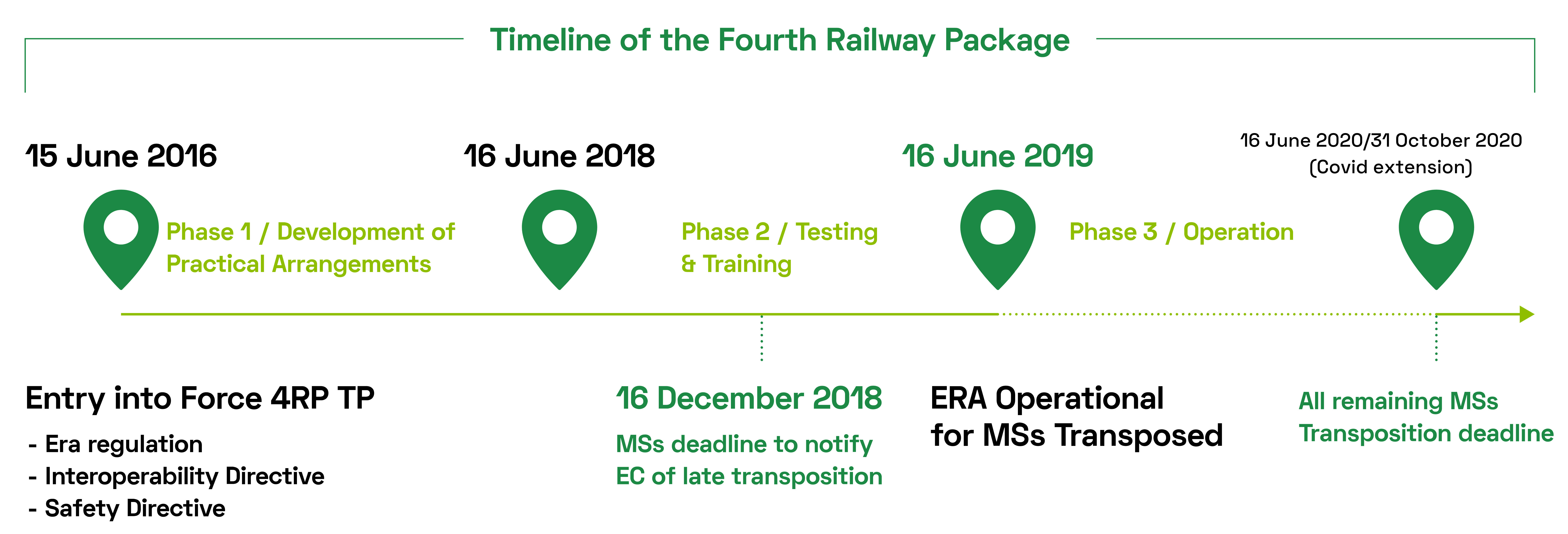Fourth Railway Package
The fourth railway package is the European commission’s legislative proposal to increase the efficiency of the European rail system. UNIFE is heavily focused on the technical pillar of the package which would bring major cost and time savings for the rail supply industry.
What is it?
Consecutive legislative railway ‘packages’ have been adopted since 2001, aimed at gradually opening rail markets and making national railway systems interoperable across the EU. In early 2013, the European Commission proposed a Fourth Railway Package (4RP), originally intended to remove the remaining legal, institutional and technical obstacles to creating a single European railway Area (SERA). The Fourth Railway Package is by far the largest and most complex legal initiative introduced so far, consisting of 6 legislative texts, pertaining to two distinct ‘pillars’.
The ‘technical pillar’, adopted by the European Parliament and the Council in April 2016, includes:
- Regulation (EU) 2016/796 on the European Union Agency for Railways and repealing Regulation (EC) n° 881/2004
- Directive (EU) 2016/797 on the interoperability of the rail system within the European Union (Recast of Directive 2008/57/EC)
- Directive (EU) 2016/798 on railway safety (Recast of Directive 2004/49/EC)
The ‘market pillar’, which was adopted in December of the same year, is composed of:
- Regulation (EU) 2016/2338 amending Regulation (EU) 1370/2007, which deals with the award of public service contracts for domestic passenger transport services by rail (‘PSO Regulation’)
- Directive 2016/2370/EU amending Directive 2012/34/EU, which deals with the opening of the market of domestic passenger transport services by rail and the governance of the railway infrastructure (‘Governance Directive’)
- Regulation (EU) 2016/2337 repealing Regulation (EEC) 1192/69 on the normalisation of the accounts of railway undertakings
Why is it important?
UNIFE is and has always been, a strong supporter of the Fourth Railway Package’s Technical Pillar. Its implementation is of paramount importance for the European rail supply industry’s future competitiveness.
Its full implementation would remove the remaining technical barriers to the Single European Rail Area by:
- Significantly reducing costs and administrative burden;
- Implementing a new harmonised framework for vehicle authorisation that saves businesses from having to file multiple costly applications for vehicle authorisations and safety certificates for operation beyond one single member state;
- Creating a ‘one-stop shop’ IT tool which will act as a single-entry point for all such applications and using easy, transparent and consistent procedures;
- Introducing a renewed framework for railway safety committed to promoting safety culture and a harmonised approach to safety certification;
- Harmonising the implementation of ERTMS with a prior check that the ERTMS trackside technical solutions envisaged are fully compliant with the relevant TSIs;
- Reducing the large number of national rules and make them more transparent;
- Enhancing the role of ERA as a European Authorising Entity.
More background information can be found in the Guide on the Fourth Railway Package Technical Pillar produced by the Group of Representative Bodies.

Member State Transposition and Entry into Operation?
For the new regime to begin the Member States had to transpose the 4th Railway Package into national law. On 16 June 2019, the new regime entered operation with ERA and eight Member States who transposed the Directives by the initial deadline, laudably Bulgaria, Finland, France, Greece, Italy, Netherlands, Romania and Slovenia. The remaining Member States had informed the EC that they will make use of the possible 1-year extension. Eventually, all remaining Member States joined by either 16 June 2020 or 31 October 2020, with the Technical Pillar now fully operational.
UNIFE’s Position and Contribution
As the official Representative Body for the European rail supply industry, UNIFE has attended all ERA working groups and workshops on the development of the 4RP legislation. It is also a member of the EC’s Expert Group on the 4RP, which has provided the sector’s consultation to the EC’s Railway Interoperability and Safety Committee (RISC) where the Member States finalise and vote on the Implementing Regulations.
Since 2016, UNIFE has worked in close cooperation with the ERA, the European Commission and the Group of Representative Bodies in the development of the European regulations and guidelines outlining the new vehicle authorisation process under the Fourth Railway Package, particularly the practical arrangements for the railway vehicle authorisation ((EU) 2018/545), development of the OSS IT Tool and the 2019 amendments to the Technical Specifications for Interoperability (TSIs). Significant efforts have been made by the and their experts within the UNIFE technical groups.
In this enhanced capacity, ERA has become the European Authorising Entity for vehicle authorisation and safety certification, ensuring uniform implementation of the EU framework. The European rail supply industry expects the Fourth Railway Package to provide a simplified, transparent, quicker and cheaper vehicle authorisation process, resulting in the stable management of vehicles and vehicle types. A harmonised European authorisation process will give certainty and consistency of requirements across the EU, with less duplication of checks, testing and administration. Further benefits are expected with the vast reduction of Notified National Technical Rules undertaken as part of the Fourth Railway Package programme.
- (EU) 2016/796 – European Union Agency for Railways (ERA) Regulation
- (EU) 2016/797 – Recast Interoperability Directive
- (EU) 2016/798 – Recast Safety Directive
- (EU) 2018/545 – Practical arrangements for the railway vehicle authorisation and railway vehicle type authorisation process pursuant to Directive (EU) 2016/797
- (EU) 2018/764 – Fees and charges payable to the European Union Agency for Railways and their conditions of payment
- (EU) 2018/867 – laying down the rules of procedure of the Board(s) of Appeal of the European Union Agency for Railways
- (EU) 2019/250 – Templates for ‘EC’ declarations and certificates for railway interoperability constituents and subsystems, on the model of declaration of conformity to an authorised railway vehicle type and on the ‘EC’ verification procedures for subsystems in accordance with Directive (EU) 2016/797
- (EU) 2019/776 – ‘2019 TSI Package’ amending TSIs LOC&PAS, CCS, WAG, INF, ENE and ERATV Regulation
More information on the new EU vehicle authorisation process and a compilation of the key regulations and guidelines can be found on the ERA website and in the 2019 updates to the TSIs.
Key Fourth Railway Package legislation to known for UNIFE Members

List of applicable legislation – railways
Document: LISTING OF DIRECTIVES RELATING TO RFU-PLG-013
According to the Interoperability Directive, the applicant declares that it has taken all applicable legislation into account when authorising a vehicle.
DV29bis states that:
“The responsibility for ensuring that the essential requirements of all applicable EU legislation are fully met in every detail by the subsystems in their design operating state at authorisation rests only with the applicant for authorisation of a subsystem, who issues the ‘EC’ declaration of verification.”
This applicable legislation includes horizontal directives and regulations that do not originate in the TSIs or the Interoperability Directive, such as emissions regulation for diesel-powered vehicles or the Safety of Toys Directive for vehicles with a nappy changing area.
Knowing what legislation applies to rail
Knowing which legislation is applicable to rail is not always easy. Horizontal legislation for all sectors with reference to harmonised standards can be found on the DG GROW website. However, this list does not clarify which legislation applies to rail.
Until the end of 2015, NBRail monitored legislation that might apply to rail and scanned it regularly for amendments. However, the new Interoperability Directive EU/2016/797 relieves the NoBo of this responsibility, placing it instead on the applicant.
One list for the entire sector
Since 1 January 2016, each applicant has been responsible for defining a list of applicable legislation which it takes into account for authorisation. For consistency between applicants, it is therefore desirable to have an agreed-upon list for the entire sector that ensures all applicants work from the same list. As such, the list would be recognised as good practice.
Agreeing on a joint list
Instead of every applicant doing its own legislative monitoring, Ricardo Certification has agreed to continue to monitor developments and supply the list to the sector.
Every two months, an updated list of applicable railway legislation will be provided by Ricardo Certification to UNIFE as a representative to the following railway sector associations: CER, EIM, EPTTOLA, ERFA, FEDECRAIL, UIC, UIP, UITP, UIRR and UNIFE.
RFU-PLG-013 requires the compilation of a listing of Directives, to be maintained for the use of the railway industry to enable compliance.
Current UNIFE activities
Since the new regime’s entry into operation, UNIFE continues to closely monitor the implementation and application of the Fourth Railway Package with our members to ensure that thee Technical Pillar becomes a success, securing the expected benefits for the European rail supply industry. These tasks include finalising the remaining EU Implementing Regulations and tasks related to the Fourth Railway Package, such as cleaning up national rules, monitoring the implementation by ERA and the Member States, collating the return of experience of the European rail supply industry and contribute to the on-going development of the ERA IT landscape (e.g. improvement to OSS, ERATV, RDD/SRD and others).
 Technical Affairs
Technical Affairs